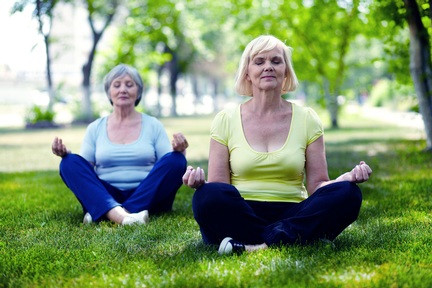£1.4m study to explore impact of yoga on elderly with multiple health problems
Academics from Northumbria University are carrying out a £1.4m study exploring the impact of yoga on older people with multiple long-term health conditions.

In the UK, two-thirds of people over the age of 65 have multimorbidity, which is defined as having two or more long-term health conditions, such as diabetes, heart disease and asthma. Multimorbidity means they are more likely to have a lower quality of life and shorter life expectancy as well as reduced physical function.
Treatments for long-term health conditions account for 70 per cent of NHS expenditure so researchers want to look at the effectiveness clinically and cost-wise of a specially-adapted yoga programme for older adults with multimorbidity, in the hope it can be used to reduce reliance on medication.
Professor Garry Tew, associate professor of Exercise and Health Sciences at Northumbria University, specialises in researching the effects of exercise programmes in people with long-term health conditions. He said: “Yoga is thought to bring wide-ranging benefits, such as increases in strength, flexibility, balance and quality of life, and reductions in stress, anxiety and depression.
“In older adults specifically, there is promising evidence that yoga can improve physical function and quality of life, but more work is needed to understand the effectiveness and cost effectiveness of yoga in older people with multimorbidity.”
The study will look at the impact of the British Wheel of Yoga’s 12-week Gentle Years Yoga programme on older people and its primary focus will be its effect on people's overall quality of life. Researchers will also assess any changes in reported levels of depression and anxiety and if they are having fewer falls because of improvements in physical function.
Professor Tew added: “We’ll also be measuring participants’ use of health care resources, which will allow us to establish the cost-effectiveness of the yoga programme. If these results are positive, they will provide evidence for healthcare commissioners to fund yoga within the NHS.”
Northumbria University will work in partnership with the University of York and independent yoga consultants on the study. They are recruiting almost 600 adults aged 65 and above who have multimorbidity from across 12 different locations in the UK.
Common yoga poses will be adapted so they can be done using chairs, so inactive older adults with long-term conditions such as osteoarthritis, high blood pressure and dementia can safely participate.
Professor George Marston, pro vice-chancellor (Research and Innovation) at Northumbria University, said: “I am absolutely delighted that this project has been funded. As our society ages, finding strategies that lead to healthy old age is becoming more and more important. Garry and his team have the skills and experience to make this project into something with tangible, direct benefits for a large proportion of our society, and will have huge impact in the coming years.”
The four-year study is being funded by the National Institute of Health Research (NIHR).
Latest News
 29-Jul-24
Dementia Bus gives carehome.co.uk staff insight into life with dementia
29-Jul-24
Dementia Bus gives carehome.co.uk staff insight into life with dementia
 27-Jul-23
UK's top home care agencies in 2023 revealed
27-Jul-23
UK's top home care agencies in 2023 revealed
 30-Nov-22
A quarter of older people keep their falls secret from family
30-Nov-22
A quarter of older people keep their falls secret from family
 29-Nov-22
'Covid-19 has not gone away' say terminally ill
29-Nov-22
'Covid-19 has not gone away' say terminally ill
 28-Nov-22
IT consultant who received poor care opens 'compassionate' home care business
28-Nov-22
IT consultant who received poor care opens 'compassionate' home care business